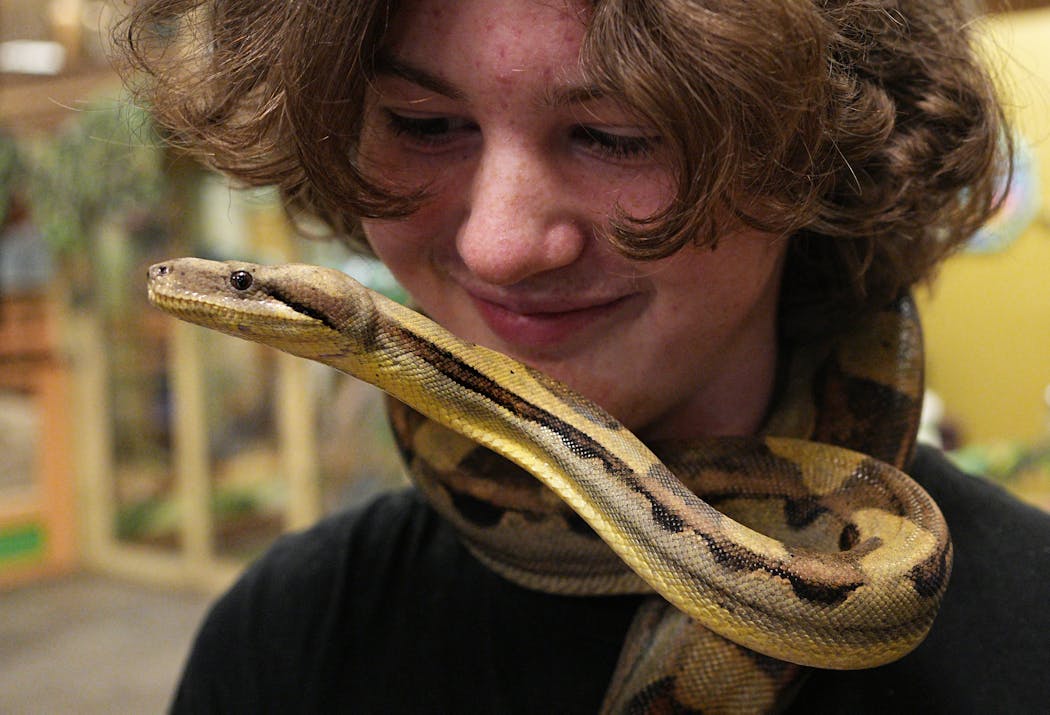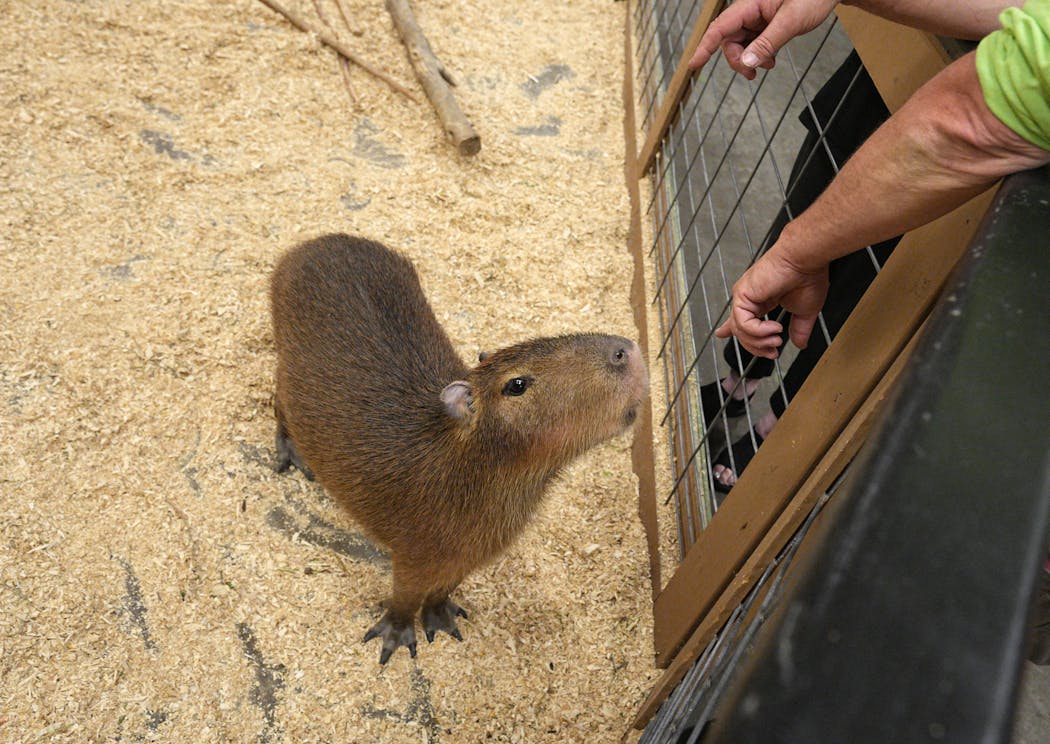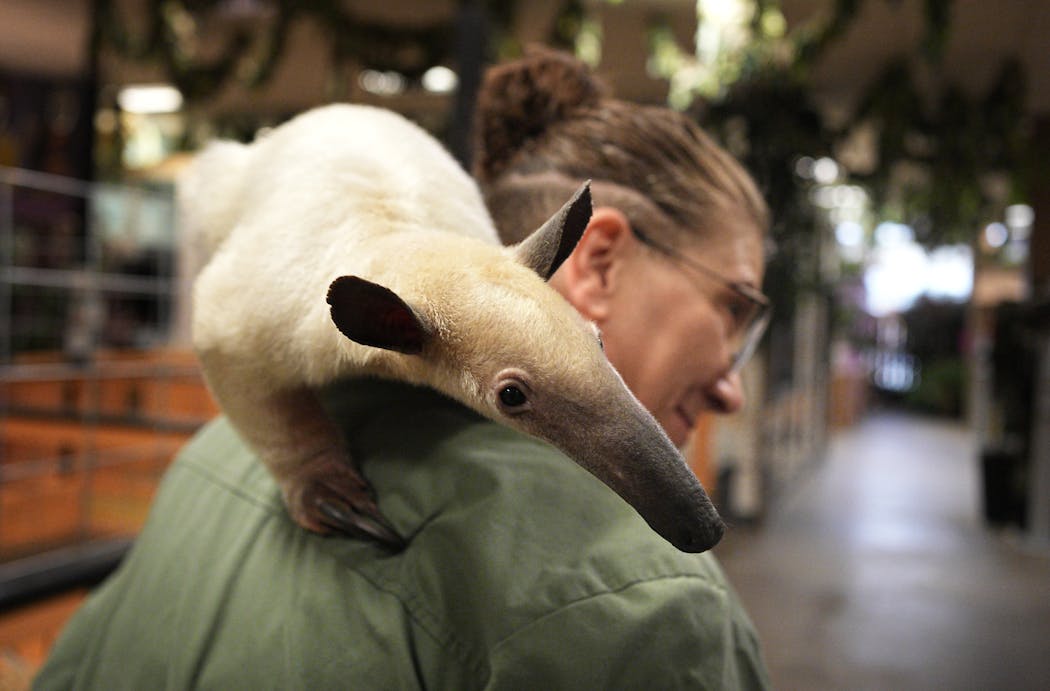Sustainable Safari is the place to go if you want to smell an anteater. Or stroke the downy fur on a baby kangaroo's head. Or be swarmed by parakeets. Or wrap a boa constrictor around your neck and feel the serpent ever-so-slightly tighten its hug, as 16-year-old Wyatt Love of Farmington did on a recent visit.
"You can feel the muscles just, like, moving — it's a strange feeling," he said cheerfully as the snake twisted around his throat.
At Sustainable Safari, in Maplewood Mall, you can interact with more than 25 species of exotic animals, including a few you might never have heard of, and probably have never seen close up. At the Safari, you can peer at them from inches away, touch them, feed them and hold them in your arms. (For some holding experiences, there's an extra charge above the $14.50 admission.)
There are kangaroos — on a recent day, two baby feet poked out from the pouch of a lounging kangaroo mom. Porcupines fanned out their decorative black-and-white-striped quills to reveal what's underneath — the more menacing black quills that can pierce flesh. Visitors carried wooden sticks coated with seeds into the aviary and suddenly found themselves extremely popular with dozens of brilliantly hued parakeets.
There were goats, foxes, deer, alligators, prairie dogs, marmosets and cute (yes, cute!) little armadillos. There were less familiar species such as coatimundi, greater grison, kinkajou, binturong and capybara — the world's largest rodent.
A slender anteater, let out of its cage for a bit, strode purposefully across the floor, apparently determined to inspect a chair.
"We let them run around a lot," said Melissa Gallup, the Safari employee in charge of supervising the animals' health. "I love anteaters. I love how they smell, too." (The latter is something of a minority opinion).
All the animals have names, many involving groan-worthy puns: the boa constrictor is Rocky Balboa, a porcupine is Don Prickles, a kangaroo is Marilyn Monroo.
The experience is meant to be fun, of course, but it also has a serious purpose. The hope is that after bonding with the Safari's animals, visitors will go away wanting to help protect their counterparts in the wild.
Non-boring pets
Bob Pilz, the Safari's founder and owner, was never one for common pets like dogs or cats or goldfish.
"That's too normal — a dog is boring," said Pilz, although he now has three and has come around to finding them "adorable."
As a kid growing up in White Bear Lake, he'd sneak quail and geese into the house, telling his mother they were for a school project. He grew up and became a firefighter, living in the White Bear Lake station where he kept a potbelly pig hidden in the basement. When his bosses found out about the porcine resident, they gave Pilz a choice between his job and the pig. He quit the fire department.
In 1998, Pilz and his wife moved to a 10-acre hobby farm in Scandia, and soon filled it with farm animals — chickens, ducks, a donkey. His wife, Mishelle, came home one day to find Pilz had acquired goats. She was fine with it.
"He's got a really great wife," said Safari President and CEO Dave Harvey with a grin.
Pilz's animal collection turned more exotic in the early 2000s, when someone brought camels to town around the holidays to appear in an event. While in Minnesota, the camels had a baby. Pilz offered the camel a home.
He gradually began collecting wild animals, trying to avoid anything native to Minnesota. For a while, he showed them at county fairs and city festivals. But the business was seasonal and inclement weather a frequent annoyance. Pilz decided to try setting up an exhibit in a warm, dry, year-round mall. In December 2019, Maplewood Mall, struggling like many malls these days, welcomed Sustainable Safari.
Pilz has some rules: He's never had anything dangerous, like lions or tigers or bears. He acquires all his animals as infants from facilities licensed by the USDA. They grow up comfortable with being around people.
None were caught in the wild — a dangerous practice even if the animal is a baby, Pilz said. A little racoon brought in from outdoors might be cute for a while, but when it matures it will become, well, a wild animal, liable to attack its owners and wreck their home.
"Three years max," Pilz said. "Then it will turn on you."
But it isn't quite wild enough — an animal that's been kept in a home, relying on humans for food, can't be returned to its natural habitat. "Chances are it will not survive," he said. Such animals should be taken to nature facilities that can train them to be put back in the wild, Pilz said.
Most of the animals in Sustainable Safari rotate in and out, alternating time at the attraction with time at Pilz's farm (a few seem to prefer the mall). They eat well and their health is closely monitored. Thanks to protection from disease and predators, Pilz's animals are likely to outlive their wild counterparts. Their cages are cleaned daily.
But that can be a problematic word — cages. Some animal lovers believe no animal should ever be kept in a cage.
"We'll get a bad review every once in a while," Pilz said. "That person came specifically here to bash us."
His counterargument is that when people can connect with animals in person rather than knowing them only from pictures taken on another part of the planet, they become more conscious of the importance of protecting the animals' wild counterparts.
"Most of the guys we have here are ambassadors for their species," Harvey said.
"I'm not someone exploiting animals for money," Pilz said. "Plenty of research shows that zoos make a big difference in the health of the planet."
Best job ever
Gallup went to work at Sustainable Safari for her own health — her mental health, which was under strain after 18 years as an emergency medical technician at North Memorial Health Hospital. She once loved her job, but as violent crime and drug abuse escalated, treating victims of gunshots and stabbings and overdoses on a daily basis was taking a toll.
"There was a lot of anxiety about going to work," Gallup said. "It kept getting worse and worse and worse. It was just hard to go in and know all these young kids are going to come in and there's nothing you can do about it."
Then she heard about Sustainable Safari.
"I was looking for something to give me some balance," she said. "I begged Dave to hire me."
At first, Gallup thought she would take a temporary break from her EMT job, she said. She spent time scooping up poop and playing with the animals. In the summer of 2020, she began working at the Safari full-time, using her medical background in the role of animal health manager. Her job involves ensuring animal well-being, scheduling veterinarian appointments and keeping track of animal health records.
She had tried other treatments for stress, but nothing helped her relax like Sustainable Safari. She still gets to care for others, but in a happier environment.
"Animals are just nicer than people — they really are," she said. "This is the best job I've ever had, hands down."

The 5 best things our food writers ate this week

A Minnesota field guide to snow shovels: Which one's best?

Summer Camp Guide: Find your best ones here

Lowertown St. Paul losing another restaurant as Dark Horse announces closing





